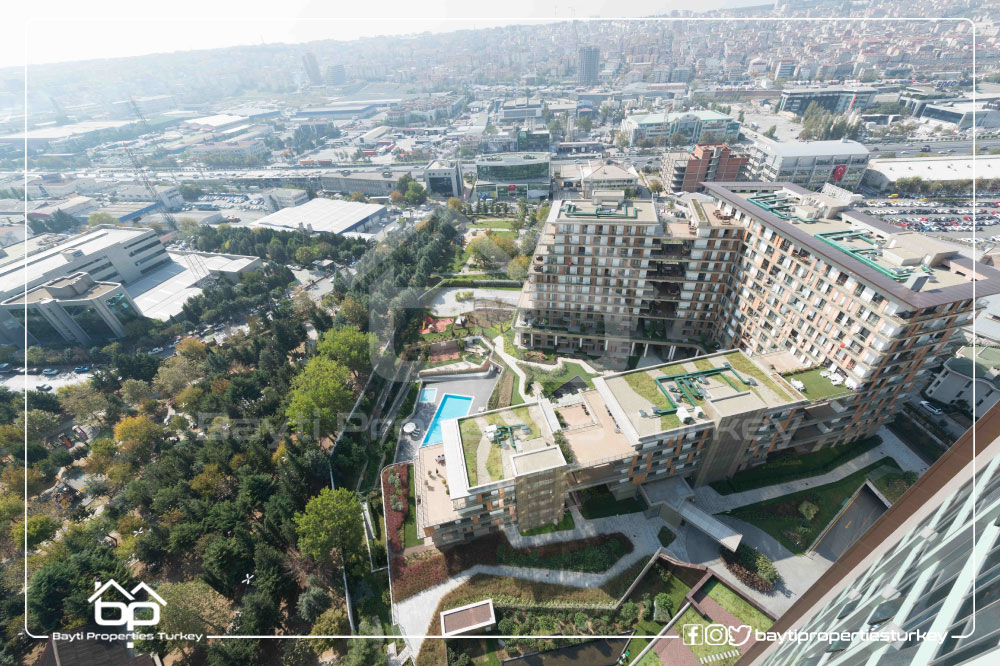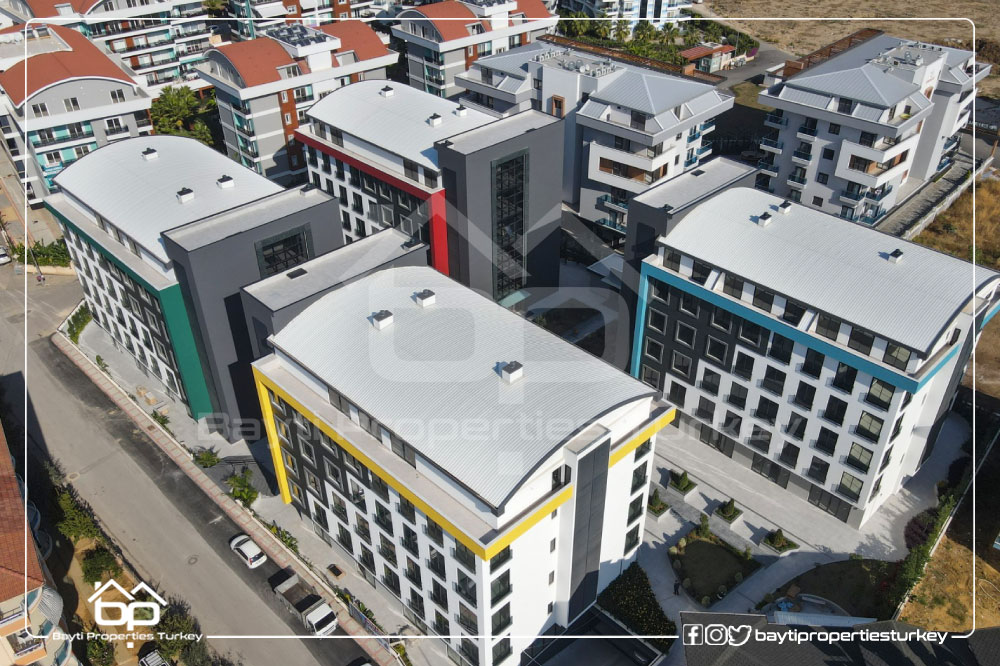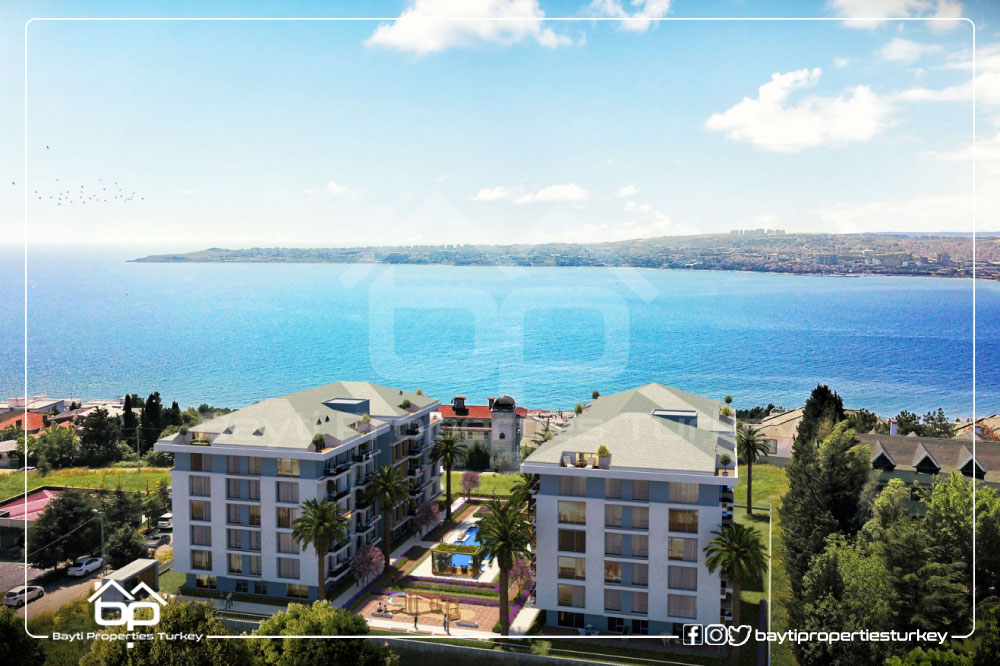Uncovering the Hidden Gems of Turkey’s Real Estate Market: A Comprehensive Guide to Investing in Cultural Riches and Sustainable Architecture
Introduction: Why Turkish Real Estate is a Smart Investment Choice
Turkey’s real estate market has been on an upward trend for the past decade. Its strategic location between Europe and Asia, growing economy, and favorable investment climate have made it an attractive destination for both local and foreign investors. From modern skyscrapers to historic Ottoman mansions, Turkey offers a diverse range of properties that cater to different budgets and preferences.
Explanation of Turkey’s Real Estate Market
Turkey’s real estate market is divided into residential, commercial, and industrial sectors. Residential properties are the most sought-after category by both locals and foreigners. Istanbul, the country’s largest city, accounts for almost half of all residential sales in Turkey.
However, other cities such as Ankara, Izmir, Antalya also offer excellent investment opportunities. Commercial properties include offices, retail spaces, hotels, and shopping centers.
The demand for commercial properties has been steadily increasing due to Turkey’s growing economy and the rise of e-commerce. On the other hand, industrial properties are mainly located in organized industrial zones (OIZs) where land prices are lower than those in urban areas.
Overview of the Current State of the Market
Despite global economic challenges caused by COVID-19 pandemic in 2020 that initially slowed down growth rates compared to previous years , Turkey’s real estate market has remained relatively strong with steady growth rates year over year since 2018 especially with online sales platforms becoming more popular among potential homebuyers . In 2019 alone , foreign property sales increased by approximatedly %14 when compared to statistics from 2018 as property transactions worth over $5 billion were made primarily by buyers from Iran , Iraq , Saudi Arabia , Kuwait , Germany , Russia & UK which was an all-time record according to Ministry of Environment & Urbanisation data.
Importance of Investing in Turkish Real Estate
Investing in Turkish real estate is a smart choice for several reasons. Firstly, Turkey has a growing economy that is expected to continue expanding. This creates opportunities for both rental income and capital appreciation of properties.
Secondly, the country offers affordable property prices compared to other European countries, making it an attractive option for investors looking for value. Thirdly, the government has implemented several policies over the past years to encourage foreign investment in the real estate sector.
For instance, foreign buyers are exempt from VAT and title deed fees under certain conditions. Overall, investing in Turkish real estate has become increasingly popular among both local and foreign investors due to its promising market conditions and favorable investment climate.
The Turkish Real Estate Market: A High-Level Overview
A Brief History of Turkey’s Real Estate Market
Turkey’s modern real estate market has a relatively short history, dating back only to the early 2000s. However, this does not mean that property ownership and development is a new concept in the country. In fact, it can be traced back to the Ottoman Empire era.
For many years, however, the industry was plagued by bureaucracy and corruption, making it difficult for foreign investors to enter the market. In 2012, Turkey passed new laws regulating real estate sales and purchases by foreigners which opened up the market for overseas investors.
Since then, Turkey’s real estate market has been growing at a rapid pace with significant amounts of investment pouring in from all over the world. As a result of these changes in legislation as well as strong economic growth rates over recent years, Turkey’s real estate sector has become an increasingly attractive location for investment.
Current Trends and Developments in The Market
In recent years there has been a shift towards more luxury developments with additional facilities such as swimming pools and gyms becoming increasingly popular among buyers both from within Turkey and overseas. Gated communities have also grown in popularity as security becomes more of a concern for homeowners. Developers have responded to this trend by incorporating modern security systems into their projects.
Another trend driving growth in the Turkish real estate market is urbanization which has led to demand for properties situated within or close to city centers where residents can enjoy easy access to amenities such as shops & restaurants. On a macro level, Turkey’s strategic location makes it an exceedingly important transit point between Europe and Asia – consequently major infrastructure investments are being made in airports/seaports/roads that will enhance its already-significant logistical importance on global trade routes.
Key Players in The Industry
The key players in the Turkish real estate industry include developers, agencies, and brokers. Developers are the entities responsible for creating new properties and selling them to buyers. The largest developers in Turkey include Emaar Properties, GAP Insaat and Sibar Group.
Real estate agencies and brokers act as intermediaries between buyers and sellers, providing assistance with negotiation, legal paperwork, and other aspects of the property transaction process. Agencies such as Antalya Homes have been instrumental in helping foreign investors navigate Turkey’s complex property laws.
Turkey’s real estate market has undergone a significant transformation over recent years. Due to favorable changes in legislation combined with strong economic growth rates, it has become an increasingly attractive location for investment.
Buyers can expect to find a range of modern luxury properties situated within or close to city centers as well as gated communities that offer added security measures. With prominent players such as Emaar Properties leading the way in development along with support from experienced agencies like Antalya Homes – Turkey’s property landscape appears poised for continued growth over the coming years.
Analysis of Popular Cities for Real Estate Investment
Turkey has a diverse range of cities to invest in, each with its own unique characteristics and investment potential. Istanbul, the largest city in Turkey, is a popular choice for real estate investors due to its economic growth and political stability. The city is also undergoing major infrastructure projects such as new airports and high-speed train lines, which make it an attractive location for both local and foreign investors.
Other cities that have been gaining popularity among investors include Izmir, Antalya, Ankara, Bursa, and Trabzon. Antalya has become increasingly popular with foreign buyers due to its picturesque coastline and booming tourism industry.
The city offers an excellent opportunity for those interested in buying a holiday home or investing in short-term rental properties. Izmir, on the other hand, is known for its industrial growth and bustling port which makes it a prime location for commercial real estate investments.
Comparison between Buying vs Renting Property
When considering investing in Turkish real estate there are several factors to take into account before deciding whether to buy or rent property. For those who are not yet ready to make a long term investment commitment or want more flexibility with their living arrangements, renting property may be the best option. Renting gives you the freedom of moving around without worrying about selling off your property first.
However, buying property can be seen as a better investment decision over time since property values tend to appreciate over time while rental rates will likely increase significantly after some time as well. With purchasing however comes more responsibility such as maintenance costs and possible decline in value making it less liquid when compared to renting.
Understanding Legal Procedures and Regulations for Foreign Investors
Foreigners are able to purchase properties in Turkey under certain conditions outlined by the government through their land registry laws for foreigners including taxation policies that differ between residents and non-residents. It is important for foreign investors to understand the legal procedures and regulations before making any investment decisions in Turkey. They include completing a title deed transfer or can be done through the offices of notaries, which requires both parties to be present with a sworn translator.
Foreigners are also required to obtain a tax identification number from the local tax office before purchasing property. Foreign investors should also seek advice from qualified agents who have experience with foreign buyers and their specific needs, since they can help with navigating through these legal requirements more efficiently and provide solutions that are tailored to their particular situation.
Unique Architectural Styles in Turkey
Turkey is a country that has been shaped by its history, culture, and geography. This fusion of influences is reflected in the architecture found throughout the country. There are many unique styles of architecture found in Turkey, ranging from ancient Byzantine and Ottoman buildings to modern contemporary structures.
One notable example of Turkish architecture is the Hagia Sophia, a former Christian church turned mosque turned museum located in Istanbul. The building was constructed in the 6th century CE and features a stunning combination of Byzantine and Islamic architectural elements.
The soaring dome, intricate mosaics, and towering minarets all contribute to making this building a true masterpiece. Another example of unique Turkish architecture can be found in Cappadocia, where homes and churches have been carved into the soft volcanic rock formations known as “fairy chimneys.” These homes blend seamlessly with their natural surroundings and provide an awe-inspiring glimpse into how humans have adapted to living within this unusual terrain.
The Impact of Cultural Heritage on Property Values
Turkey is a country with a rich cultural heritage that spans thousands of years. As such, property values can often be influenced by cultural factors such as historical significance or traditional craftsmanship. For example, properties located near important historical sites or landmarks may carry higher values due to their proximity to these sites.
Additionally, properties that feature traditional Turkish design elements such as mosaic tiles or wooden carvings can also command higher prices due to their aesthetic appeal and cultural importance. In some cases, unique cultural features may even be protected by law which can drive up property values further.
However, it’s important to note that while cultural heritage can influence property values positively, it can also lead to challenges during renovations or construction projects. Careful consideration must be given to preserving any cultural elements while still ensuring the safety and comfort of modern residents.
The Role of Environmental Sustainability in Modern Developments
As the world becomes more aware of the impact of climate change, environmental sustainability has become a critical consideration in modern developments. Turkey is no exception, with many developers and architects working to create buildings and communities that are both environmentally friendly and aesthetically pleasing. One example of sustainable development in Turkey is the Maslak 1453 project, a massive mixed-use development that aims to reduce its environmental impact through features such as solar panels and rainwater harvesting.
Other developers are incorporating green roofs or vertical gardens into their designs to help mitigate the heat island effect and provide a natural habitat for local fauna. By taking a holistic approach to design that considers not only aesthetics but also sustainability, Turkish architects and developers are creating communities that will stand the test of time while minimizing their impact on the environment.
Conclusion
Throughout this article, we have explored the fascinating world of Turkish real estate. We have looked at the current state of the market and discussed the importance of investing in this exciting industry. We have also delved into niche subtopics such as popular cities for investment, legal procedures and regulations for foreign investors, and unique architectural styles found in Turkey.
Additionally, we have examined rarely known small details relating to cultural heritage and environmental sustainability, which can impact property values. Overall, Turkey’s real estate market is one that offers great potential for both local and foreign investors.
The country boasts a rich cultural heritage that has contributed to unique architectural styles that are highly sought after by buyers. The legal framework for foreign investors has been simplified over recent years, making it easier than ever before to invest in property in Turkey.
As we look towards the future of Turkey’s real estate market, there are many reasons to be optimistic. With its young population and growing economy, demand for housing is set to increase in the coming years.
Furthermore, with new developments incorporating sustainable design principles on the rise, there is a growing awareness of environmental issues within the industry. This bodes well not only for investors but also for those who are concerned about responsible development.
Turkish real estate offers a wealth of opportunities for those who are looking to invest in a vibrant and dynamic market with enormous potential for growth and development. Whether you are interested in properties located in popular cities or less well-known regions with incredible cultural heritage or environmentally friendly design principles incorporated into their projects – there truly is something here for everyone!











